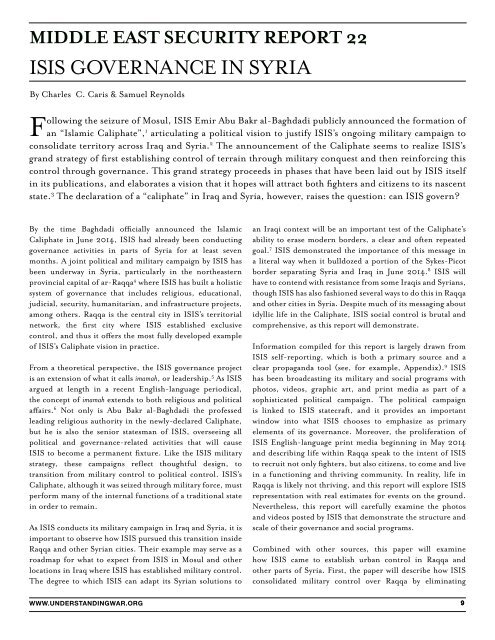ISIS_Governance
ISIS_Governance
ISIS_Governance
Create successful ePaper yourself
Turn your PDF publications into a flip-book with our unique Google optimized e-Paper software.
MIDDLE EAST SECURITY REPORT 22<br />
<strong>ISIS</strong> <strong>Governance</strong> in Syria<br />
By Charles C. Caris & Samuel Reynolds<br />
Following the seizure of Mosul, <strong>ISIS</strong> Emir Abu Bakr al-Baghdadi publicly announced the formation of<br />
an “Islamic Caliphate”, 1 articulating a political vision to justify <strong>ISIS</strong>’s ongoing military campaign to<br />
consolidate territory across Iraq and Syria. 2 The announcement of the Caliphate seems to realize <strong>ISIS</strong>’s<br />
grand strategy of first establishing control of terrain through military conquest and then reinforcing this<br />
control through governance. This grand strategy proceeds in phases that have been laid out by <strong>ISIS</strong> itself<br />
in its publications, and elaborates a vision that it hopes will attract both fighters and citizens to its nascent<br />
state. 3 The declaration of a “caliphate” in Iraq and Syria, however, raises the question: can <strong>ISIS</strong> govern?<br />
By the time Baghdadi officially announced the Islamic<br />
Caliphate in June 2014, <strong>ISIS</strong> had already been conducting<br />
governance activities in parts of Syria for at least seven<br />
months. A joint political and military campaign by <strong>ISIS</strong> has<br />
been underway in Syria, particularly in the northeastern<br />
provincial capital of ar-Raqqa 4 where <strong>ISIS</strong> has built a holistic<br />
system of governance that includes religious, educational,<br />
judicial, security, humanitarian, and infrastructure projects,<br />
among others. Raqqa is the central city in <strong>ISIS</strong>’s territorial<br />
network, the first city where <strong>ISIS</strong> established exclusive<br />
control, and thus it offers the most fully developed example<br />
of <strong>ISIS</strong>’s Caliphate vision in practice.<br />
From a theoretical perspective, the <strong>ISIS</strong> governance project<br />
is an extension of what it calls imamah, or leadership. 5 As <strong>ISIS</strong><br />
argued at length in a recent English-language periodical,<br />
the concept of imamah extends to both religious and political<br />
affairs. 6 Not only is Abu Bakr al-Baghdadi the professed<br />
leading religious authority in the newly-declared Caliphate,<br />
but he is also the senior statesman of <strong>ISIS</strong>, overseeing all<br />
political and governance-related activities that will cause<br />
<strong>ISIS</strong> to become a permanent fixture. Like the <strong>ISIS</strong> military<br />
strategy, these campaigns reflect thoughtful design, to<br />
transition from military control to political control. <strong>ISIS</strong>’s<br />
Caliphate, although it was seized through military force, must<br />
perform many of the internal functions of a traditional state<br />
in order to remain.<br />
As <strong>ISIS</strong> conducts its military campaign in Iraq and Syria, it is<br />
important to observe how <strong>ISIS</strong> pursued this transition inside<br />
Raqqa and other Syrian cities. Their example may serve as a<br />
roadmap for what to expect from <strong>ISIS</strong> in Mosul and other<br />
locations in Iraq where <strong>ISIS</strong> has established military control.<br />
The degree to which <strong>ISIS</strong> can adapt its Syrian solutions to<br />
an Iraqi context will be an important test of the Caliphate’s<br />
ability to erase modern borders, a clear and often repeated<br />
goal. 7 <strong>ISIS</strong> demonstrated the importance of this message in<br />
a literal way when it bulldozed a portion of the Sykes-Picot<br />
border separating Syria and Iraq in June 2014. 8 <strong>ISIS</strong> will<br />
have to contend with resistance from some Iraqis and Syrians,<br />
though <strong>ISIS</strong> has also fashioned several ways to do this in Raqqa<br />
and other cities in Syria. Despite much of its messaging about<br />
idyllic life in the Caliphate, <strong>ISIS</strong> social control is brutal and<br />
comprehensive, as this report will demonstrate.<br />
Information compiled for this report is largely drawn from<br />
<strong>ISIS</strong> self-reporting, which is both a primary source and a<br />
clear propaganda tool (see, for example, Appendix). 9 <strong>ISIS</strong><br />
has been broadcasting its military and social programs with<br />
photos, videos, graphic art, and print media as part of a<br />
sophisticated political campaign. The political campaign<br />
is linked to <strong>ISIS</strong> statecraft, and it provides an important<br />
window into what <strong>ISIS</strong> chooses to emphasize as primary<br />
elements of its governance. Moreover, the proliferation of<br />
<strong>ISIS</strong> English-language print media beginning in May 2014<br />
and describing life within Raqqa speak to the intent of <strong>ISIS</strong><br />
to recruit not only fighters, but also citizens, to come and live<br />
in a functioning and thriving community. In reality, life in<br />
Raqqa is likely not thriving, and this report will explore <strong>ISIS</strong><br />
representation with real estimates for events on the ground.<br />
Nevertheless, this report will carefully examine the photos<br />
and videos posted by <strong>ISIS</strong> that demonstrate the structure and<br />
scale of their governance and social programs.<br />
Combined with other sources, this paper will examine<br />
how <strong>ISIS</strong> came to establish urban control in Raqqa and<br />
other parts of Syria. First, the paper will describe how <strong>ISIS</strong><br />
consolidated military control over Raqqa by eliminating<br />
www.Understandingwar.org 9


